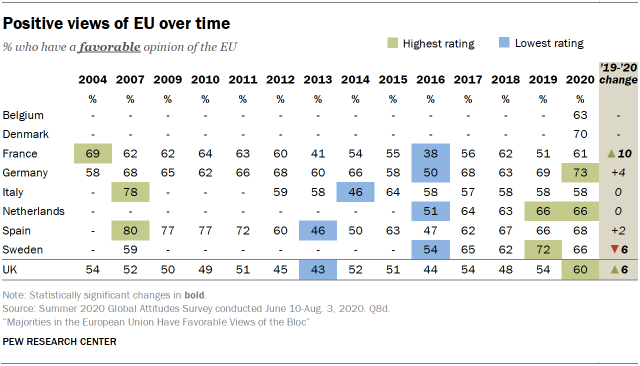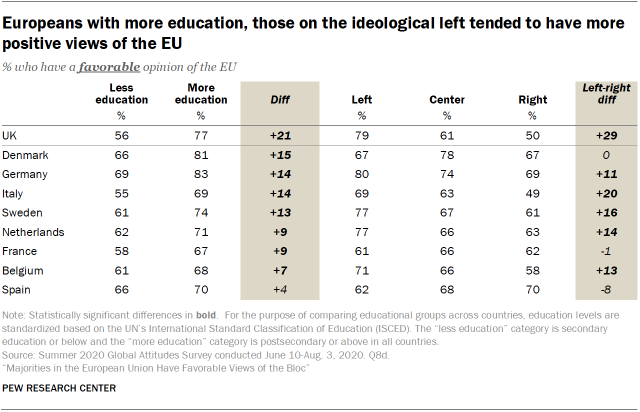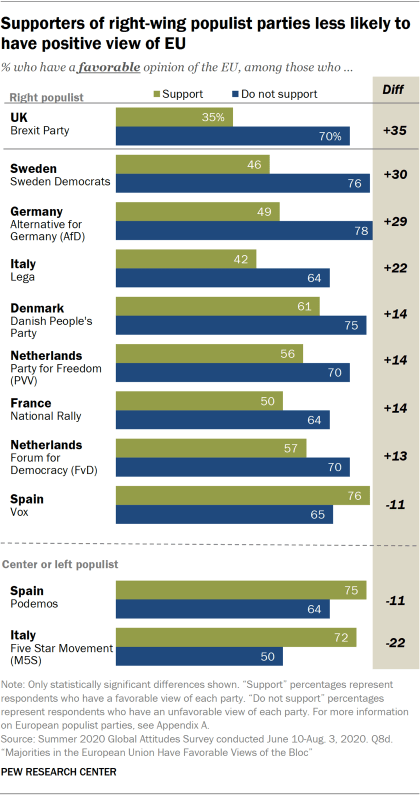 The European Union was seen more favorably than not across each of the eight EU member countries surveyed this summer. A median of 66% across these countries expressed a positive opinion, with positive ratings ranging from a low of 58% in Italy to a high of 73% in Germany – that nation’s most positive assessment of the EU since the question was first posed in 2004.
The European Union was seen more favorably than not across each of the eight EU member countries surveyed this summer. A median of 66% across these countries expressed a positive opinion, with positive ratings ranging from a low of 58% in Italy to a high of 73% in Germany – that nation’s most positive assessment of the EU since the question was first posed in 2004.
While their country is no longer a member of the economic and political union, 60% of Britons viewed the EU favorably, compared with 37% who had a negative view. In the UK, too, this was the most positive assessment of the organization over the 16 years Pew Research Center has polled Britons on the topic.
Outside of the record highs recorded in Germany and the UK, positive views of the EU increased substantially in France, from 51% in 2019 to 61% this year. Elsewhere, views have largely held steady. Only in Sweden did EU favorability decline, from 72% in 2019 to 66% this year.

 Across most of the EU countries surveyed, those ages 18 to 29 were more likely to hold favorable views of the EU than those 50 and older. For example, 80% of Dutch adults under 30 had a positive view of the organization, compared with 62% of their older counterparts.
Across most of the EU countries surveyed, those ages 18 to 29 were more likely to hold favorable views of the EU than those 50 and older. For example, 80% of Dutch adults under 30 had a positive view of the organization, compared with 62% of their older counterparts.
The largest age difference in views of the EU comes from outside the bloc: Younger Britons were 22 percentage points more likely to have a favorable view of the EU than those ages 50 and older.
In most European countries, those with more education were more likely to hold a favorable view of the EU than those with less education.1 In Denmark, for example, 81% of those with a postsecondary education or more had a positive view of the EU, compared with 66% of those with a secondary education or less. In the UK, those with more education were 21 percentage points more likely to have a favorable view of the EU than those with less education.

In several countries, those who placed themselves on the ideological left were also more favorable toward the EU than those on the right. In Italy, for example, those on the left were 20 points more likely to express a favorable view of the EU than those on the right.
 Europeans who held favorable views of right-wing populist parties were less likely to have a positive opinion of the EU than those who held unfavorable views. (For more information on European populist parties, see Appendix A.)
Europeans who held favorable views of right-wing populist parties were less likely to have a positive opinion of the EU than those who held unfavorable views. (For more information on European populist parties, see Appendix A.)
In Sweden, those who supported the right-wing Sweden Democrats were 30 percentage points less likely to have a favorable view of the EU than those who did not support the Sweden Democrats. Double-digit differences in EU favorability were present between supporters and nonsupporters of nearly every right-wing populist party included in the survey.
Only in Spain were those with a favorable view of the right-wing Vox party more likely to have a favorable opinion of the EU than those with an unfavorable view of the party.
Supporters of the left-wing Podemos in Spain and the centrist Five Star Movement in Italy were also more likely to have a favorable view of the EU than nonsupporters.


